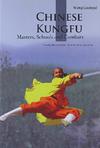中国功夫
2010-1
五洲传播出版社
王广西
124
韩慧枝
Wushu, the Chinese martial art form known as kungfu in the West, embodies the national traditional culture in martial art form and also reflects the self-defense and health practices of Chinese people. The core philosophy of Wushu is drawn from the Confucius principle of physical and mental integration combined with neutralization; the Taoist principle of dynamic balance; the Buddhist principle of showing cultural syncretism of Confucianism, Daoism and Buddhism in China; and the Eastern theory, which believes man is an integral part of nature.
Wang Guangxi, whose pen name is LuCao, was born in Xixia, Henan province in1941 and died in 2008. He graduated from the Department of Chinese Language and Literature of Henan University. He had servedas a researcher in the Literature Research Institute of He nan Academy of Social Science, a fellow in the Henan Research Institute of Culture and History, standing director of Modern Chinese Literature Research Society and deputy dean of Wushu Culture Research Center, Physical Education Institute, Zhengzhou University. His life was devoted to modern literature and wushu culture research, and his works include Buddhism and Chinese Modern Poetry, Biography of Zuo Zong tang, Kong Fu-Culture of Chinese Wushu Circles Chinese Soldier, Chinese Wushu and Wushu Spirit and Central Plaint Culture. Wushu.
ForewordThe Origins of Martial ArtsPrinciples of WushuSchools of WushuShaolinquan FamilyWudangquan FamilyEmeiquan FamilyNanquan FamilyTaijiquan FamilyXingyiquan FamilyBaguaquan FamilyWeaponsShort WeaponsLong WeaponsHidden Weapons (anqi)Three Stages of Chinese Wushu PracticeCharacteristics of Chinese WushuSystematicStrict OrderPrinciple of GradualnessNurturing Qi and Moral CultivationAestheticsChinese Wushu and Chinese CultureWushu and RegimenWushu and Literatures, Films and TVChinese and Foreign Wushu ExchangeTwo Big Challenges in the Martial HistoryChinese Wushu Going GlobalDevelopment of Modern Chinese WushuModern Wushu Centers (schools)Wushu Education at Colleges and UniversitiesWushu Competitions and Olympic PerformanceEventsFolk Wushu DevelopmentDevelopment TendencyAppendix I: Notices on Wushu ExercisesAppendix Ih Chronological Table of the ChineseDynasties
版权页: 插图: After learning the basic techniques and several set exercises,one can learn Chaiquan to practice several actions,which lays a firm foundation in hand,footwork,eye and body exercises.Simultaneously,one can gather the qi scattered in the body in dantian to eliminate the excess tension and grow strong strength.Once the excess tension is eliminated completely,the body will be full of strong strength,spirit and vitality.The body then becomes strong,and the steps steady.The visible strength has been achieved,while the exercises benefiting the bones are completed.This brings one to reach the level of refining spirit into qi. People who complete the primary stage are usually strong and vigorous,and have sharp eyes.Sometimes,they are hot-blooded,unyielding,impetuous and proud of their martial art techniques.If they pursue further study to enter a senior level such characteristics can be refined. Refining qi into vitality refers to the intermediate stage,where one completes the exercises to benefit the muscles and grow invisible strength.Invisible strength refers to soft strength.However,"soft" in Wushu doesn't mean "weak," but "flexible." The invisible strength integrates soft and strong strengths,which supplement each other.The stage of refining qi into vitality is meant to eliminate strong strength and grow soft strength.This stage is the second period of strength improvement. Refining qi is key to this stage.In fact,one shall learn to gather the qi scattered in the body in dantian during the primary stage of refining the spirit into qi,during which one cannot control the flow of genuine qi(zhenqi).
《中国功夫(英文版)》由五洲传播出版社出版。

书的质量不错,里面还有颜色。是帮朋友买的,就是觉得太薄了~